Welcome to the fascinating realm of Roman mythology, where gods and goddesses reigned supreme and shaped the ancient Roman civilization. The Romans worshipped a pantheon of deities, drawing inspiration from Greek mythology while adding their own unique twist. These ancient gods and goddesses were believed to have played a pivotal role in the founding of Rome and influenced every aspect of daily life. Through their worship, rituals, and sacred temples, the Romans sought divine favor and protection.
Join us on a journey through the captivating world of Roman gods, exploring the rich tapestry of myths, legends, and religious practices. Uncover the stories behind powerful figures like Jupiter, Juno, Minerva, and many more. Discover the intricate relationship between the Roman gods and the people, the influence of these deities on Roman culture, and their enduring impact on modern society. Delve into the temples, shrines, and festivals dedicated to their worship, and unravel the complexities of ancient Rome through the lens of its mythology.
Prepare to be enchanted by tales of divine intervention, explore the captivating imagery and symbolism associated with the Roman gods, and gain a deeper understanding of the ancient Roman civilization. Through our exploration of Roman gods and goddesses, we will unlock the secrets of a bygone era and unearth the timeless wisdom and cultural significance they continue to hold.
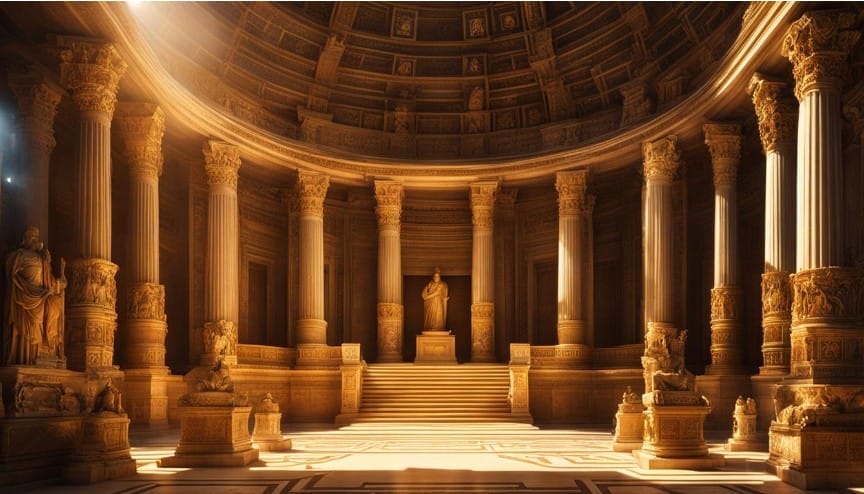
Key Takeaways:
- Roman mythology was heavily influenced by Greek culture and mythology but possessed its own unique deities.
- Worship of the Roman gods and goddesses was an integral part of daily life and played a significant role in shaping Roman society.
- The Romans absorbed the deities and cults of other cultures, fostering a policy of tolerance within the empire.
- The conflict between the Roman gods and Christianity ultimately led to the rise of Christianity as the dominant religion in the Roman Empire.
- Studying Roman gods and goddesses provides insights into the beliefs, values, and social structures of ancient Rome.
The Influence of the Roman Gods and Goddesses over the People
The ancient Romans held a deep reverence for their gods and goddesses, and their influence permeated every aspect of Roman society. Religion was a central part of Roman culture, with no distinction between the state and the church. The same priests who led religious ceremonies also held political positions, demonstrating the intertwined nature of religion and governance.
The Romans believed that their success and prosperity were directly linked to their relationship with the gods and goddesses. After each conquest, the victorious general would offer a portion of their spoils as a token of gratitude to the gods and to seek their continued favor. Temples were built throughout the empire, serving as sacred places for worship and rituals dedicated to the deities. These acts of devotion were seen as a way to ensure divine assistance during difficult times.
One of the most prominent examples of the influence of the gods and goddesses was the construction of temples and shrines dedicated to their worship. The Romans believed that the gods resided within these sacred spaces, and they would visit them to seek blessings and guidance. These temples were adorned with statues and artwork depicting the deities, allowing the Romans to visually connect with their gods.
It is important to note that the influence of the Roman gods and goddesses was not limited to religious practices alone. Their presence extended to the realms of politics, military campaigns, and even daily life. The Romans believed that neglecting the worship of their gods would invoke divine anger and bring about misfortune, while proper devotion and reverence would ensure the well-being of the empire and its people.

| Impact of Roman Gods and Goddesses | Examples |
|---|---|
| Political Influence | The same priests who led religious ceremonies also held political positions. |
| Military Campaigns | Generals offered a portion of their spoils to the gods after each conquest. |
| Daily Life | The Romans believed that neglecting the worship of their gods would bring divine anger. |
| Art and Culture | The gods and goddesses were depicted in sculptures, mosaics, and paintings. |
In conclusion, the gods and goddesses of ancient Rome held immense influence over the people. Their worship was a central part of Roman life, with temples and rituals dedicated to their honor. The gods were seen as divine protectors and benefactors, and their presence was believed to ensure the success and prosperity of the empire. The study of the influence of the Roman gods and goddesses allows us to gain a deeper understanding of the complexities of ancient Roman civilization and the integral role that religion played within it.
Relationship of the Roman Mythology Gods with Other Cultures
The Roman empire had a unique approach to incorporating the gods and goddesses of other cultures into their own pantheon. Instead of eradicating local beliefs, the Romans chose to absorb and assimilate the deities of the conquered territories. This policy of tolerance and acceptance towards other religions helped maintain social stability within the empire.
The Romans believed that by preserving the traditions and worship of conquered cultures, they could win the acceptance and loyalty of the conquered people. This approach allowed for a diverse pantheon of gods to coexist within the empire, creating a rich tapestry of beliefs and rituals. The Roman gods often took on new names and attributes as they merged with the gods of other cultures.
This cross-cultural assimilation can be seen in the practices of the Roman religion. Temples were built to honor various gods, both within the Roman pantheon and those borrowed from other cultures. These temples served as meeting places for worshippers from different backgrounds, fostering a sense of unity and inclusivity within the empire.
To illustrate the relationship between the Roman mythology gods and other cultures, here is a table highlighting some of the gods assimilated into the Roman pantheon:
| NAME | ORIGIN | CHARACTERISTICS |
|---|---|---|
| Annona | Mythical personification of the annual food supply | |
| Apollo | Greek | Good of healing and prophecy |
| Asclepius | Greek | God of healing |
| Attis | Phrygian | Beloved of Cybele |
| Bacchus | Greek as Dionysos | God of wine |
| Bellona | Goddess of War | |
| Bona Dea | The ‘Good Goddess’; unnamed spirit whose rites were attended only by women | |
| Cardea | Household goddess of door hinges | |
| Castor & Pollux (Dioscuri) | Greek | Two legendary heroes |
| Ceres | Greek as Demeter | Goddess of agriculture |
| Consus | God of the granary | |
| Cybele | Phrygian | See ‘Magna Mater’ |
| Diana | Greek as Artemis | Goddess of light, also unity of peoples |
| Dis | Greek as Pluto | God of the underworld |
| Faunus | Greek as Pan | God of fertility |
| Flora | Goddess of fertility and flowers | |
| Forculus | Household god of doors | |
| Fortuna (also Fors, Fors Fortuna) | Goddess of good luck | |
| Genius | Male spirit of the Roman family | |
| Glaucus | A sea God | |
| Hercules | Greek as Herakles | God of victory and commercial enterprise |
| Hermes | See Mercury | |
| Isis | Egyptian | Goddess of the earth |
| Janus | God of doorways | |
| Juno | Greek as Hera | Goddess of women |
| Jupiter (English Jove) | Greek as Zeus | God of the heavens |
| Juturna | Goddess of fountains | |
| Lar (plural Lares) | a Spirit of the household | |
| Larvae (or Lemures) | mischievous spirits of the dead | |
| Liber | God of fertility and vine growing | |
| Libitina | Goddess of the dead | |
| Limentinus | Household god of the threshold | |
| Magna Mater | Phrygian as Cybele | The ‘Great Mother’, goddess of nature |
| Magnes | Spirits of the dead | |
| Mars | God of war | |
| Mercury | Greek as Hermes | God of merchants |
| Minerva | Greek as Athena | Goddess of crafts and industry |
| Mithras | Persian as Mithra | God of the sun |
| Neptune | Greek as Poseidon | God of the sea |
| Nundina | Presiding Goddess at the purification and naming of children | |
| Ops | God of of the wealth of the harvest | |
| Osiris | Egyptian | Consort of Isis |
| Pales | God/Goddess of shepherd | |
| Penates | Household spirits of the store cupboard | |
| Picumnus & Pilumnus | Agricultural gods associated with childbirth | |
| Pomona | Goddess of fruit | |
| Portunus | God of harbours | |
| Priapus | God of fertility in gardens and flocks | |
| Quirinus | State god under whose name Romulus was worshipped | |
| Robigus | God of mildew | |
| Roma | Goddess of Rome | |
| Sabazius | Phrygian | God of vegetation |
| Salus | God of health | |
| Serapis | Egyptian | God of the sky |
| Saturn | Greek as Chronos | God of sowing |
| Silvanus | God of woods and fields | |
| Sol | Helios | God of the sun |
| Tellus | Goddess of earth | |
| Terminus | God of property boundaries | |
| Venus | Greek as Aphrodite | Goddess of love |
| Vertumnus (also Vortumnus) | God of orchards | |
| Vesta | Greek as Hestia | Goddess of the hearth |
| Volturnus | God of the Tiber river | |
| Vulcan | Greek as Hephaistos | God of fire |
Through this policy of absorbing deities from other cultures, the Romans created a religious landscape that promoted tolerance and acceptance. The diverse beliefs and rituals within the Roman empire enriched the lives of its people and contributed to the cultural legacy of ancient Rome.
The Conflict between the Roman Gods Pantheon and the Christians
The conflict between the Roman gods and the Christians was intense because the Romans considered rejection of their gods as high treason. The Romans saw Christianity as a form of atheism, while the Christians viewed the Roman gods as pagan. The Romans persecuted Christians for their rejection of the Roman pantheon and for their refusal to participate in the state rituals dedicated to the gods. The Romans considered this rejection a threat to the stability of the empire and punished Christians for it. The conflict between the Roman gods and Christianity eventually led to the rise of Christianity as the dominant religion in the Roman Empire.
“We will not worship your gods,” said the Christians defiantly. “We have our own God, and we will not bow down to pagan idols.”
The Persecution of Christians
The Romans perceived the Christians’ rejection of their gods as an act of defiance that challenged the social and political order. As the conflict escalated, the Roman authorities began to persecute Christians, considering them a threat to the empire’s stability. Christians were subjected to various forms of punishment, including imprisonment, torture, and execution. The Roman emperors saw the persecution of Christians as a way to maintain the dominance of the Roman pantheon and preserve the unity of the empire.
The Triumph of Christianity
Despite the persecution, Christianity continued to grow and thrive. The resilience of the Christian community, combined with the appeal of its teachings, led to the eventual triumph of Christianity over the Roman gods. The Roman Empire eventually embraced Christianity as its official religion, marking a significant shift in the religious landscape. The conflict between the Roman gods and Christianity shaped the course of history and had a lasting impact on the development of Western civilization.
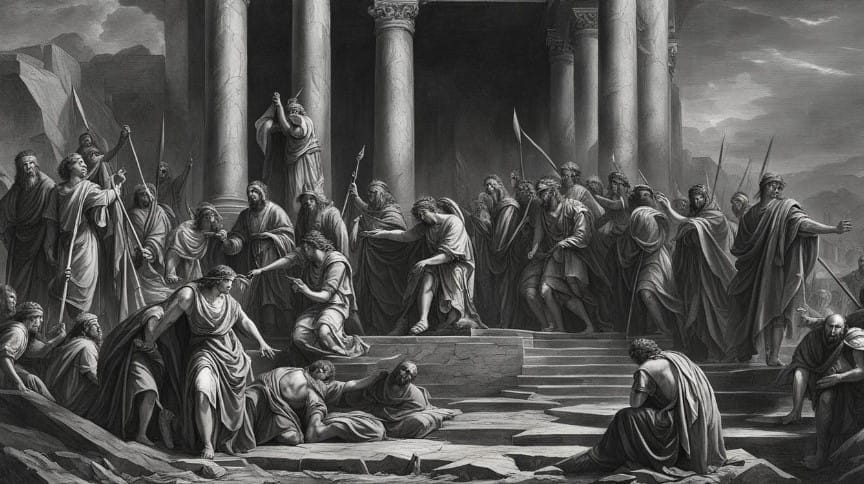
Relationship of the Gods of Roman Mythology with Their Own People
The Romans believed that their gods and goddesses had a close relationship with their own people. The worship of these deities was an integral part of daily life, and neglecting their worship was considered a form of atheism. The Romans believed that their devotion to the gods and the proper performance of rituals were crucial for maintaining harmony between humans and the divine. They believed that the gods looked favorably upon those who showed reverence and devotion, bringing blessings and prosperity to their lives.
However, the Romans also recognized the importance of striking a balance in their relationship with the gods. They believed that excessive fear and improper use of divine knowledge could invoke the wrath of the gods. The Romans understood that being too dependent on the gods or not taking personal responsibility for their actions could lead to negative consequences. Therefore, they sought to maintain a respectful and balanced relationship where worship and devotion were accompanied by personal agency and responsibility.
The Romans believed that neglecting the worship of their gods was a form of atheism and brought divine anger upon them. They considered their devotion to the gods and proper performance of rituals as essential for maintaining the harmony between the gods and humans.
This belief in the importance of a harmonious relationship with the gods extended beyond individual lives to the well-being of the entire empire. The Romans believed that the gods had a direct influence on the success and prosperity of their society. They saw their devotion to the gods as essential for the well-being of the empire as a whole. Temples and rituals dedicated to the gods were therefore widespread, serving as a means for the Romans to express their reverence and seek divine assistance in all aspects of life.
Overall, the relationship between the gods of Roman mythology and their own people was one of reverence, devotion, and mutual dependence. The Romans believed that by honoring the gods and maintaining a harmonious relationship, they could ensure the favor and blessings of the divine and lead prosperous lives.
Festivals in the Honor of the Roman Gods and Goddesses
The worship of the Roman gods and goddesses was accompanied by festive celebrations throughout the year. The Romans had approximately 40 religious festivals dedicated to specific deities. These festivals were an important way for the Romans to show their devotion and seek the blessings of the gods. For example, the Vestalia was a festival dedicated to the Roman goddess Vesta. Festivals were also held to celebrate military victories and honor the achievements of Roman generals. These festivals involved rituals, sacrifices, and public gatherings, all aimed at honoring and appeasing the gods.
“The festivals in honor of the Roman gods and goddesses were grand affairs that brought the community together,” says Dr. Julia Smith, a Roman history expert. “People from all walks of life participated in these celebrations, which were marked by processions, feasts, and elaborate ceremonies. It was a time of joy and gratitude, as the Romans believed that the gods played a crucial role in their lives and desired their worship and adoration.”
One of the most famous festivals in ancient Rome was the Saturnalia, dedicated to the god Saturn. This festival, which took place in December, was characterized by feasting, gift-giving, and temporary role reversals, where slaves would become masters for a day. The Romans also celebrated the Lupercalia, a fertility festival dedicated to the god Lupercus, which involved purification rites and the running of the Luperci, young priests, through the streets of Rome.
Table: Roman Festivals
| Festival | Deity | Month |
|---|---|---|
| Vestalia | Vesta | June |
| Saturnalia | Saturn | December |
| Lupercalia | Lupercus | February |
| Quinquatria | Minerva | March |
| Bona Dea | Bona Dea | May |
| Vinalia | Venus | April |
These festivals not only provided an opportunity for religious devotion but also had social and cultural significance. They were a time of communal unity, where people came together to celebrate their shared beliefs and heritage. The festivals served as an important reminder of the interconnectedness between the gods, the people, and the state, reinforcing the religious and social fabric of Roman society.
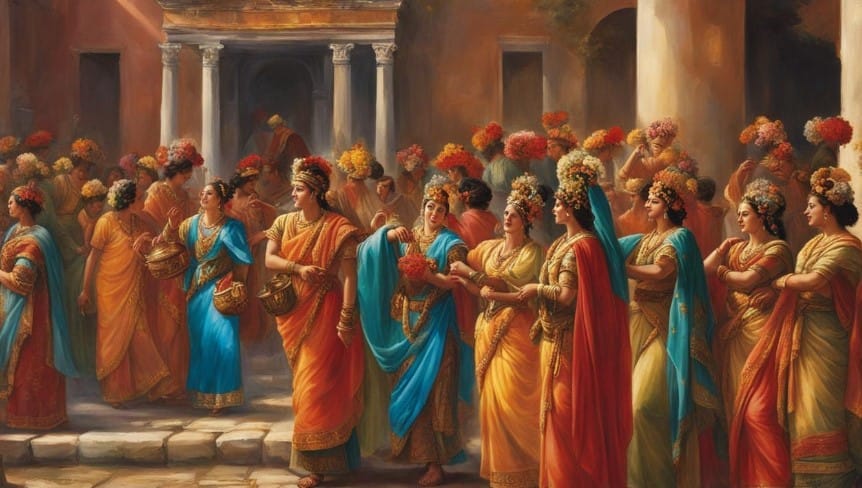
In conclusion, the festivals in honor of the Roman gods and goddesses were an integral part of ancient Roman culture. They were occasions of joy, gratitude, and communal celebration, where the Romans sought the favor and blessings of their deities. These festivals showcased the religious devotion of the Romans and served as a means to maintain the harmony between the gods, the people, and the state.
Temples and Shrines to Worship the Ancient Roman Gods and Goddesses
The ancient Romans built grand temples and shrines as sacred places of worship for their gods and goddesses. These architectural marvels were not only places of prayer but also symbols of the Romans’ devotion and reverence towards their deities. Temples were dedicated to specific gods and goddesses, while shrines could be found in various public spaces and sacred sites throughout the empire.
One of the most famous temples in ancient Rome was the Pantheon, dedicated to all the gods. This magnificent structure featured a large dome and intricate architectural details. Inside, statues of the gods adorned the walls, and the altar served as a focal point for rituals and offerings. The Pantheon still stands today as a testament to Rome’s rich religious heritage.
Other notable temples included the Temple of Jupiter Optimus Maximus, dedicated to the king of the gods, and the Temple of Venus and Roma, honoring both the goddess of love and beauty and the city of Rome itself. These temples were not only places of worship but also important centers of cultural and political life.
| Temple Name | Main Deity | Location |
|---|---|---|
| Temple of Jupiter Optimus Maximus | Jupiter | The Capitoline Hill, Rome |
| Temple of Venus and Roma | Venus and Roma | The Roman Forum, Rome |
| Temple of Saturn | Saturn | The Roman Forum, Rome |
| Temple of Vesta | Vesta | The Roman Forum, Rome |
Shrines, on the other hand, were smaller structures or sacred areas devoted to a specific deity. They could be found in public squares, crossroads, and even in private homes. Families often had their own household shrines where they would offer prayers and make offerings to their chosen gods.
The Romans believed that these temples and shrines were the dwelling places of the gods, and visiting them was a way to seek blessings, guidance, and protection. The worship of the ancient Roman gods was deeply ingrained in daily life, and the temples and shrines served as physical manifestations of the connection between the mortal and divine realms.
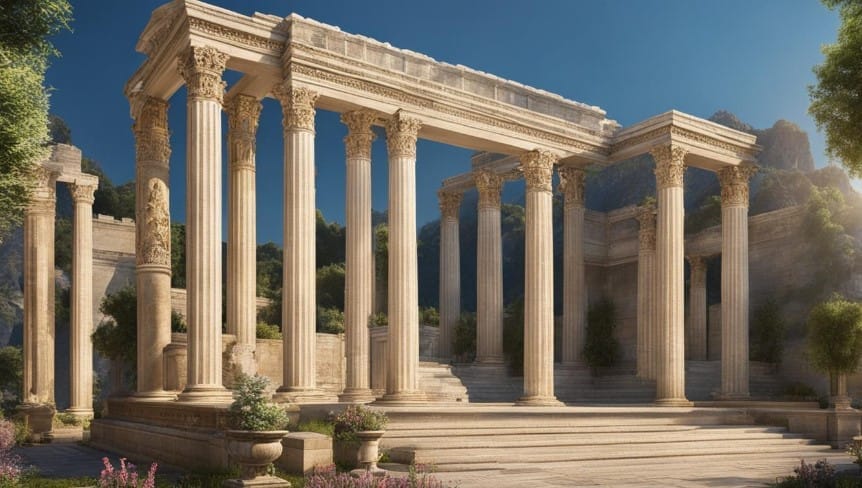
Quote:
“The temples and shrines of ancient Rome are a testament to the Romans’ deep devotion to their gods and goddesses. These sacred sites served as places of worship, reflection, and communion with the divine. They were not only architectural marvels but also symbols of the Romans’ religious and cultural identity. The temples and shrines of ancient Rome continue to inspire awe and fascination to this day.”
Influence of Roman Mythology on Art and Culture
Roman mythology had a profound impact on the art and culture of the Roman Empire. The stories and characters from Roman mythology provided inspiration for a wide range of artistic expressions, including sculptures, mosaics, and literature. These artistic representations not only reflected the beliefs and values of the ancient Romans but also served as a means of storytelling and education.
Sculptures were a prominent form of artistic expression in ancient Rome. Roman sculptors skillfully depicted the gods and goddesses of Roman mythology, capturing their power, beauty, and divine attributes. These sculptures adorned public spaces, temples, and private residences, serving as a constant reminder of the presence and influence of the gods in everyday life.
Mosaics were another significant art form influenced by Roman mythology. These intricate designs made of small, colored tiles depicted mythological scenes and narratives. Mosaics were often found in the floors of Roman villas and public buildings, adding beauty and depth to architectural spaces. They not only showcased the skill of the craftsmen but also conveyed important mythological stories to the viewers.
| Form of Art | Examples |
|---|---|
| Sculptures | Venus de Milo, Augustus of Prima Porta |
| Mosaics | The Alexander Mosaic, The Unswept Floor |
| Literature | The Aeneid by Virgil, Metamorphoses by Ovid |
Literature also played a significant role in the preservation and celebration of Roman mythology. Writers such as Virgil and Ovid produced epic poems and stories that expanded on the mythological heritage of the ancient Mediterranean. Virgil’s The Aeneid told the story of Aeneas, a legendary Trojan hero who founded Rome, while Ovid’s Metamorphoses explored the theme of transformation through various mythological tales.
The influence of Roman mythology on art and culture extends beyond the ancient world. Today, references to Roman gods and goddesses can still be found in contemporary literature, films, and other forms of popular media. This enduring fascination with Roman mythology speaks to its enduring relevance and impact on human imagination and creativity.
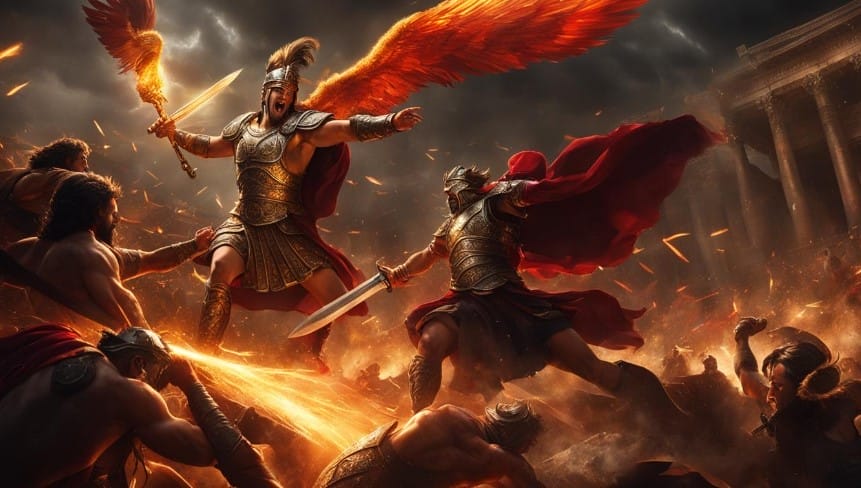
Roman Gods and Goddesses in Modern Culture
The mythology of the Roman gods and goddesses continues to have an impact on modern culture. These ancient deities have found their way into various forms of art, literature, and popular media, leaving a lasting influence on contemporary society. References to Roman gods and goddesses can be found in movies, books, video games, and even fashion.
Table 1: Roman Gods and Goddesses in Modern Culture
| Domain | Examples in Modern Culture |
|---|---|
| Love and Beauty | Aphrodite/Venus is often referenced in romance novels and represents love and desire. |
| War and Strategy | Mars/Ares is a common symbol in military organizations and video games centered on warfare. |
| Wisdom and Strategy | Athena/Minerva is often portrayed as an intelligent and strategic character in literature and movies. |
| Underworld and Death | Hades/Pluto is frequently depicted in fantasy and supernatural books and movies. |
These are just a few examples of how Roman mythology has permeated modern culture. The rich stories, powerful imagery, and symbolic meanings associated with the gods and goddesses make them an enduring source of inspiration for artists and creators.
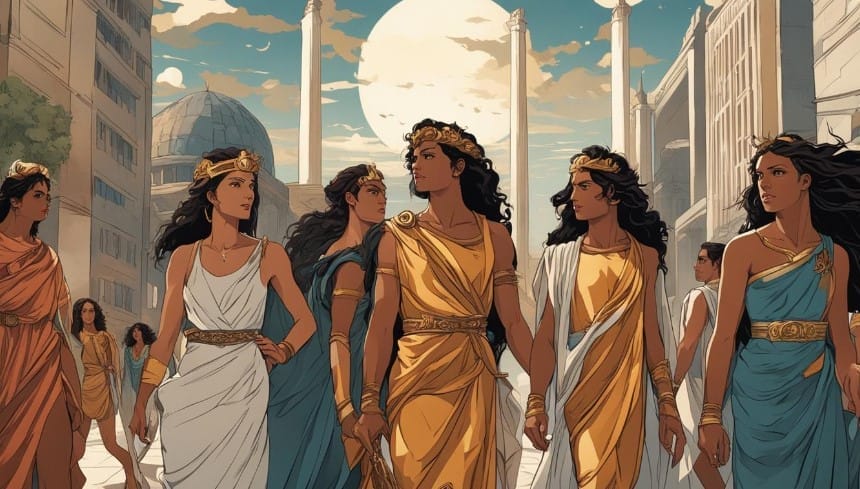
Whether it’s a movie that draws inspiration from the epic tales of Hercules or a fashion line that incorporates Roman-inspired designs, the influence of these ancient deities can be seen everywhere. The names of the planets in our solar system are also derived from Roman gods, further embedding their legacy in our everyday lives.
By referencing Roman gods and goddesses, modern culture not only pays homage to the rich history of ancient Rome but also taps into the timeless themes and archetypes they represent. From gods of love to gods of war, these mythological figures continue to captivate and inspire, weaving their way into the fabric of our modern world.
Importance of Studying Roman Gods and Goddesses in Understanding Ancient Rome
Studying the Roman gods and goddesses is crucial for gaining a comprehensive understanding of ancient Rome and its rich cultural heritage. The worship of these deities played a central role in Roman society and shaped the daily lives of its people. Exploring Roman mythology provides valuable insights into the beliefs, values, and social structures of ancient Rome.
Roman mythology offers a window into the religious practices and rituals of the time. It reveals the importance of divine patronage and the role of the gods in various aspects of Roman life, including agriculture, warfare, and governance. By studying the stories and symbolism associated with the gods, we can decipher the religious ceremonies, festivals, and rites that were performed to honor and appease them.
Furthermore, understanding Roman mythology is essential for comprehending the art, literature, and architecture of ancient Rome. The gods and goddesses were frequently depicted in sculptures, mosaics, and paintings, often conveying moral, political, and historical narratives. These artistic representations offer a glimpse into the values and ideals of Roman society, as well as the influence of Greek mythology on Roman culture.
| Benefits of Studying Roman Gods and Goddesses in Understanding Ancient Rome |
|---|
| Insights into religious practices and rituals |
| Understanding the role of the gods in various aspects of Roman life |
| Deciphering religious ceremonies, festivals, and rites |
| Comprehending the art, literature, and architecture of ancient Rome |
By examining the myths, legends, and traditions associated with Roman gods and goddesses, historians and scholars can reconstruct the cultural and social fabric of ancient Rome. This knowledge allows us to delve deeper into the complexities of Roman civilization and gain a more nuanced understanding of their worldview, ethics, and ideals. Ultimately, the study of Roman gods and goddesses is essential for unraveling the fascinating tapestry of ancient Roman culture.
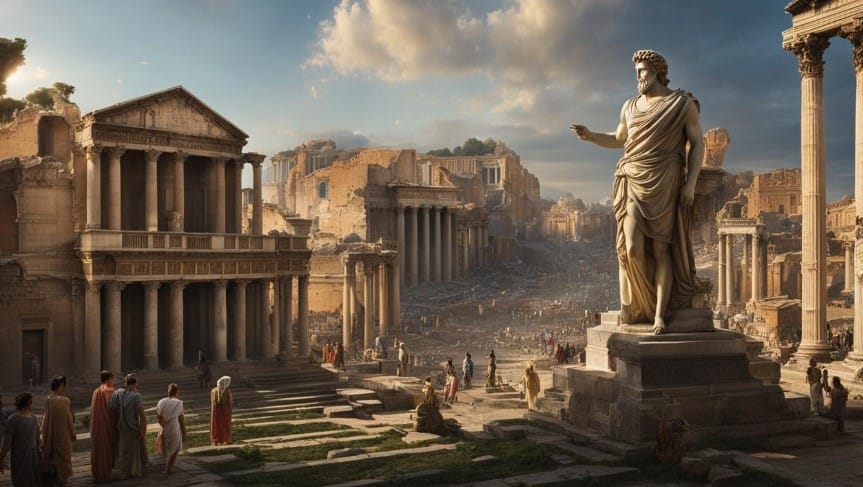
References:
1. Beard, M., North, J., & Price, S. R. F. (Eds.). (1998). Religions of Rome: Volume 1, A History. Cambridge University Press.
2. Grant, M. (1978). Myths of the Romans: Volume 1, The Gods. Penguin Books.
3. Scheid, J. (1999). An Introduction to Roman Religion. Indiana University Press.
Conclusion
In conclusion, the world of Roman gods and goddesses offers us a captivating glimpse into the beliefs and values of ancient Rome. The worship of these deities played a crucial role in Roman society, with temples and rituals dedicated to their honor. The Roman pantheon of gods, influenced by Greek mythology but with its own unique deities, shaped the religious and cultural landscape of the empire.
The influence of the Roman gods and goddesses extended beyond religious practices. They were integrated into every aspect of Roman life, influencing art, literature, and even daily rituals. Festivals and celebrations were held to honor and seek the blessings of these revered beings, and their impact can still be seen in the rich artistic heritage of ancient Rome.
Studying the Roman gods and goddesses is paramount in understanding the complexities of ancient Roman civilization. It allows us to unravel the beliefs, values, and social structures of the time. Their stories and symbolism provide valuable insights into the art, literature, and rituals that defined the Roman Empire. By exploring the world of Roman mythology, we can gain a deeper appreciation for the ancient Roman gods and their enduring influence on our collective imagination.
FAQ
What is Roman mythology?
Roman mythology refers to the beliefs and stories surrounding the gods and goddesses worshipped by the ancient Romans.
How many gods did the Romans worship?
The Romans worshipped multiple gods and goddesses, with their pantheon comprising a large number of deities.
Were the Roman gods influenced by Greek gods?
Yes, many of the Roman gods were influenced by Greek culture and mythology, although they were given different names.
How did the Romans worship their gods?
The Romans worshipped their gods through rituals, sacrifices, and offerings. They built temples and performed ceremonies dedicated to their deities.
Did the Romans tolerate other religions?
Yes, the Romans had a policy of absorbing the deities and cults of other cultures instead of eradicating them. They built temples to worship the gods of conquered territories.
Why did the Romans persecute Christians?
The Romans persecuted Christians because they rejected the Roman gods and refused to participate in state rituals. The Romans saw this as a threat to the stability of the empire.
How did the Romans view neglect of their gods?
The Romans believed that neglecting the worship of their gods brought divine anger upon them. They considered their devotion and rituals essential for maintaining harmony with the gods.
What were Roman festivals?
Roman festivals were celebratory events dedicated to specific gods and goddesses. They involved rituals, sacrifices, and public gatherings to honor and seek the blessings of the deities.
Where did the Romans worship their gods?
The Romans worshipped their gods in temples and shrines. Families had their own household shrines, while the state built majestic temples dedicated to the gods.
How did Roman mythology influence art and culture?
Roman mythology had a profound influence on the art and culture of the Roman Empire. The gods and goddesses were incorporated into artwork, sculptures, mosaics, and literature.
How do Roman gods and goddesses impact modern culture?
References to Roman gods and goddesses can be found in art, literature, and popular media. They continue to inspire and fascinate contemporary audiences.
Why is studying Roman gods and goddesses important?
Studying Roman gods and goddesses helps us understand ancient Rome and its culture. It provides insights into their beliefs, values, and social structures.
Source Links
- https://www.worldhistory.org/Roman_Mythology/
- https://www.nationalgeographic.org/article/gods-and-goddesses-ancient-rome/
- https://oldworldgods.com/romans/

Historian Franco Cavazzi dedicated hundreds of hours of his life to creating this website, roman-empire.net as a trove of educational material on this fascinating period of history. His work has been cited in a number of textbooks on the Roman Empire and mentioned on numerous publications such as the New York Times, PBS, The Guardian, and many more.
